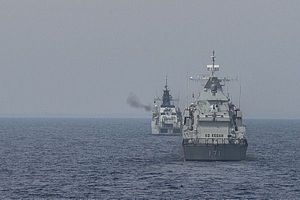On Monday, the Malaysian Marine Police Force and the Philippines National Police Maritime Group met for their first bilateral meeting. The three-day event is testament to both the growing collaboration between two sides in the maritime security realm as well the inroads they are gradually making on issues central to their interests in spite of the challenges that remain.
The holding of the meeting itself is significant and deserves recognition. Though Malaysia and the Philippines have long had shared challenges ranging from piracy to terrorism, disagreements and disputes between the two sides have previously often limited cooperation. (See: “Malaysia Warns Philippines’ Duterte Against ‘Reigniting’ Sabah Dispute”).
But following a rather rocky start with the rise of President Rodrigo Duterte, Kuala Lumpur and Manila have been stepping up collaboration over the last few months. The momentum from the November summit between Duterte and Malaysian Prime Minister Najib Razak has been sustained with follow up meetings and visits, including that of Malaysian police chief Khalid Abu Bakar in late December 2016 (See: “Philippines’ Duterte to Visit Malaysia With Security High on the Agenda”). The meeting this week between the maritime police of both sides indicates that cooperation is gradually moving from commitments at the leader level to practical implementation.
In terms of the agenda, Malaysian officials said the three-day meeting was intended to cover a wide-range of security issues, including illegal fishing, transnational crime, and terrorism. All of these areas are central in their own right within the context of the bilateral relationship. For instance, on the terrorism front, Malaysia’s disruption of a new Islamic State (IS) cell this month planning to use the eastern state of Sabah as a transit point for sending militants to the Philippines was another reminder of the importance of closer bilateral security ties.
But the headline item was the further implementation by the two sides of trilateral patrols that have been agreed on by Malaysia, the Philippines and Indonesia. As I have written before, the three countries had agreed to conduct coordinated maritime patrols as part of a broader plan to tackle rising security challenges in the waters bordering them (See: “New Sulu Sea Trilateral Patrols Officially Launched in Indonesia”). Even if many of these challenges are longstanding, some of them such as terrorism and transnational crimes have been a rising concern of late (See: “Confronting Threats in the Sulu-Sulawesi Seas: Opportunities and Challenges”).
Though the leaders have agreed to the move, its implementation will require a series of follow-up steps by security forces on all sides. For instance, in the Malaysia-Philippine context, although Najib had said during his summit meeting with Duterte last November that the Philippine leader had granted permission for Malaysia to pursue kidnappers beyond the Malaysian border and into Philippine waters, they need to determine exactly how this would work. As Sabah Police Commissioner Ramli Din put it to the New Straits Times, the so-called cross-border pursuits require “the proper mechanism to implement it.”
In a move to facilitate the implementation of maritime patrols, Ramli said both countries would form a new joint enforcement working group which would lead to more intelligence sharing as well as increased collaboration in the patrolling of waters between the two countries. He offered few specifics on this new group. But it is yet another example of how maritime security cooperation between Malaysia and the Philippines is gradually begin to show tangible progress amid rising threats.
































